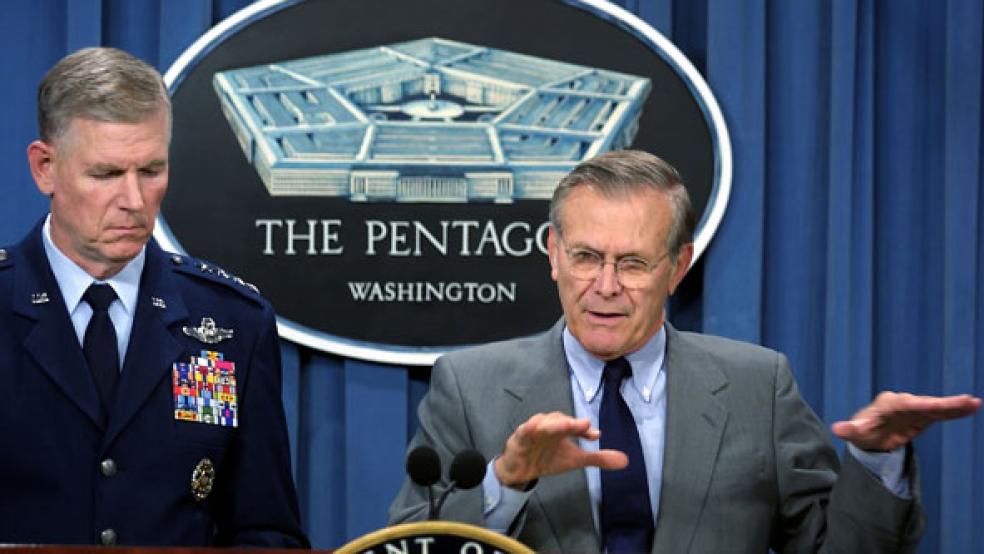In a spirited defense of the U.S. military and of the necessity for continued vigilance against terrorism, Donald Rumsfeld, former Secretary of Defense, said Thursday night that this country shouldn’t try to balance the budget by cutting from the military. “The people who are running around saying they want to cut the Pentagon [budget] don’t know what they’re talking about,” Rumsfeld said. “The money isn’t there.” Instead, it’s “entitlements,” he said, that must be targeted for spending cuts in order to get this country’s fiscal house in order.
His came minutes before counter terrorism officials announced a new credible threat targeted at New York and Washington DC, and three days before the 10th anniversary of the September 11 attacks. On Thursday, a spokesman for the Department of Homeland Security, Matt Chandler, said the threat was “specific, credible, but unconfirmed.” The president, who plans to be in NY Sunday to attend the ceremony honoring those who died on 9/11, directed security officials to redouble efforts in responseattack threat. New York City Mayor Michael Bloomberg told reporters that additional police would be deployed around the city, while Gov. Andrew Cuomo said residents should be cautious, but “there is no reason to panic.”
Rumsfeld spoke at an event entitled “9/11, A Decade Later: Lessons Learned and Future Challenges,” at the 92nd Street Y in Manhattan, co-sponsored by the Jewish Policy Center. He was on a panel that included Ari Fleischer, former White House press secretary for George W. Bush during the 9/11 attacks, from 2001 to 2003, and Michael Mukasey, who served as U.S. Attorney General from 2007 to 2009. Journalist Michael Medved was moderator.
Rumsfeld’s remarks were interrupted several times by protestors both inside and outside the building who called Rumsfeld “a war criminal” and said he should be prosecuted. “Shut up,” several people shouted back at the protestors. Moderator Medved kept the talk moving briskly along and said at various times to the panelists, “The thing for us to do is just continue.”
Recalling the morning of September 11, Ari Fleischer, who was with President Bush when the planes hit, said that on that morning, “I knew everything had changed and that we were under attack.” Rumsfeld recalled being at work in the Pentagon the morning of the attacks, and said at the moment the first plane hit he was talking “about the need to increase the defense budget … in the event something happened.” Like Fleisher, he thought the first plane hitting the tower “must be an accident,” but after the second tower and Pentagon were hit he said, “immediately I knew we had been attacked.”
The Pentagon “building literally shook,” he said. President Bush that morning asked him to “start thinking about what our response should be,” especially after CIA Director George Tenet “said they had intelligence information that confirmed it was al-Queda and Osama bin Laden” behind the attacks.
The initial reaction on the part of the administration, said Rumsfeld, “was not to retaliate or punish” anyone, “but to protect the American people.” The way that needed to be done, he said, was to “put pressure on the terrorists by making things more difficult for them – more difficult to communicate, more difficult to move around… We knew this was going to be a sustained effort,” he added, including forming a coalition of 90 other countries to share intelligence “and put pressure on terrorists all over the world.”
Rumsfeld acknowledged that the economic loss to America “was enormous,” given that “the essence of America is freedom, the freedom to go out and live.” He defended Bush’s remarks at the time to “go shopping,” which he said was meant as an expression of the freedoms, both large and small, that so many take for granted on a daily basis.
Rumsfeld also said that “terrorists have an enormous advantage in that they can attack at any moment.” He recalled seeing a note after the Beirut barracks bombing in 1983, in which someone, presumably a terrorist or a terrorist sympathizer, had written, “You have to be right all the time – we only have to be right once.” And he suggested that the Obama administration had largely left in place robust anti-terror surveillance and other programs, “because they couldn’t find a better solution.” These programs, he said, “have in fact protected us over an amazing number of years.”
Fleischer added that a “doctrine of preemption works and preserves peace,” and said pointedly that what seems missing from the current GOP presidential candidates’ debates thus far is a discussion of the threats posed by Iran and its plans for nuclear weapons. Rumsfeld agreed and said, “Iran looks around the world and sees Pakistan, Russia, other countries with nuclear weapons.” And Iran thinks, “why not us."
Medved asked the panel to discuss the claim that some “kind of blowback” in the form of terrorism toward this country was inevitable because of generations of U.S. interventions overseas. Rumsfeld replied, “It’s rubbish to blame America. Why do you think people are lined up in U.S. embassies all around the world to try to come here?” All three panelists stressed the need for good intelligence in the face of continued activity by terrorists around the world, and of maintaining “an offensive mindset that we must have,” said Mukasey.
When Medved asked what Rumsfeld would he do if President Obama was ever on the other end of the line, asking him to offer his service to America under this administration, Rumsfeld replied, “I’ve been married 56 and a half years. My wife would leave me.”





